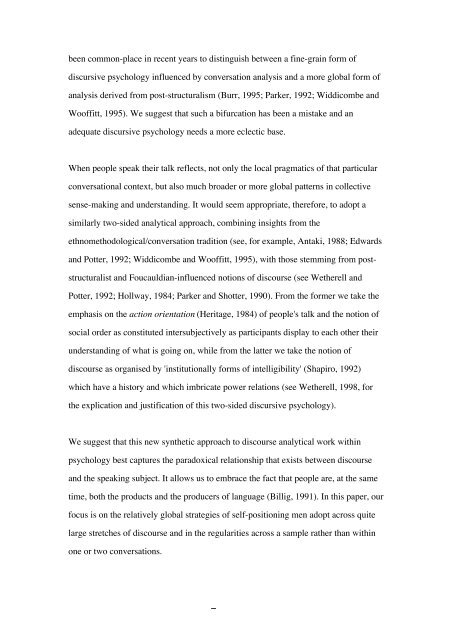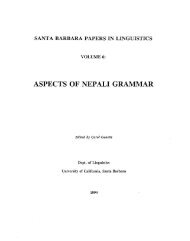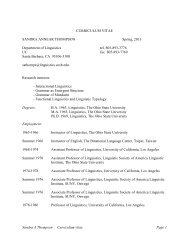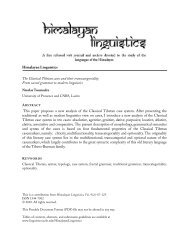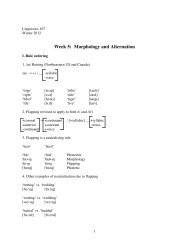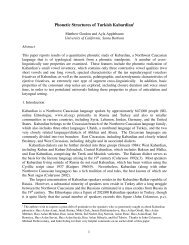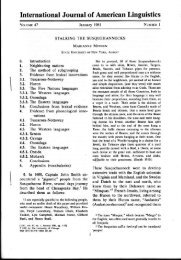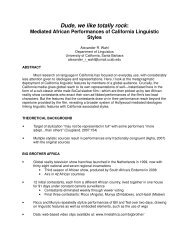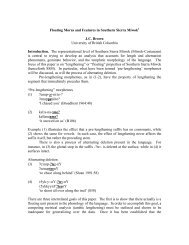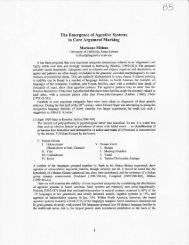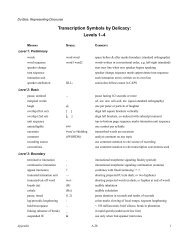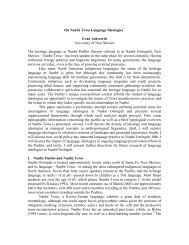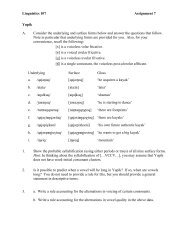Negotiating Hegemonic Masculinity: Imaginary ... - UCSB Linguistics
Negotiating Hegemonic Masculinity: Imaginary ... - UCSB Linguistics
Negotiating Hegemonic Masculinity: Imaginary ... - UCSB Linguistics
You also want an ePaper? Increase the reach of your titles
YUMPU automatically turns print PDFs into web optimized ePapers that Google loves.
een common-place in recent years to distinguish between a fine-grain form of<br />
discursive psychology influenced by conversation analysis and a more global form of<br />
analysis derived from post-structuralism (Burr, 1995; Parker, 1992; Widdicombe and<br />
Wooffitt, 1995). We suggest that such a bifurcation has been a mistake and an<br />
adequate discursive psychology needs a more eclectic base.<br />
When people speak their talk reflects, not only the local pragmatics of that particular<br />
conversational context, but also much broader or more global patterns in collective<br />
sense-making and understanding. It would seem appropriate, therefore, to adopt a<br />
similarly two-sided analytical approach, combining insights from the<br />
ethnomethodological/conversation tradition (see, for example, Antaki, 1988; Edwards<br />
and Potter, 1992; Widdicombe and Wooffitt, 1995), with those stemming from post-<br />
structuralist and Foucauldian-influenced notions of discourse (see Wetherell and<br />
Potter, 1992; Hollway, 1984; Parker and Shotter, 1990). From the former we take the<br />
emphasis on the action orientation (Heritage, 1984) of people's talk and the notion of<br />
social order as constituted intersubjectively as participants display to each other their<br />
understanding of what is going on, while from the latter we take the notion of<br />
discourse as organised by 'institutionally forms of intelligibility' (Shapiro, 1992)<br />
which have a history and which imbricate power relations (see Wetherell, 1998, for<br />
the explication and justification of this two-sided discursive psychology).<br />
We suggest that this new synthetic approach to discourse analytical work within<br />
psychology best captures the paradoxical relationship that exists between discourse<br />
and the speaking subject. It allows us to embrace the fact that people are, at the same<br />
time, both the products and the producers of language (Billig, 1991). In this paper, our<br />
focus is on the relatively global strategies of self-positioning men adopt across quite<br />
large stretches of discourse and in the regularities across a sample rather than within<br />
one or two conversations.<br />
7


